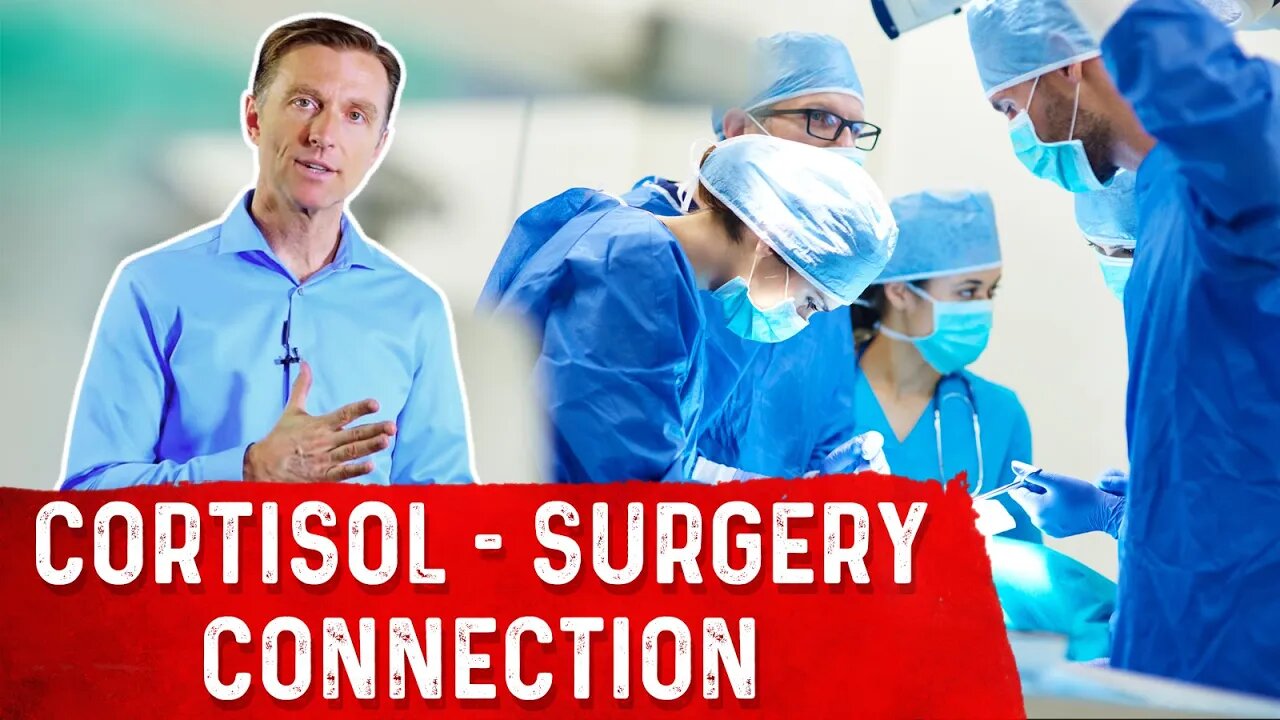Premium Only Content

High Cortisol Occurs During and After Surgery – Cortisol Levels & Surgery Side Effects – Dr.Berg
Why do you experience a cortisol spike after surgery? Take a look.
DATA:
https://pubmed.ncbi.nlm.nih.gov/28758231/
https://onlinelibrary.wiley.com/doi/full/10.1111/cen.13820
Timestamps
0:00 Cortisol spike after surgery
1:20 Why cortisol activates after surgery
1:49 Cortisol, potassium, glucose, and sodium
2:19 Side effects of cortisol after surgery
3:24 What should you do for high cortisol after surgery?
4:56 Key takeaways
In this video, we’re going to talk about cortisol spikes after surgery.
Now, it would make sense if stress didn’t go up too much because of anesthesia—you can’t feel pain while under. However, this isn’t the case.
Your body still feels and reacts to pain while under. In turn, your body reacts to it with cortisol—the stress hormone.
How much cortisol spikes correlate with the severity of an invasive procedure.
Surgery activates both the inside and outside of the adrenals. This causes an increase in both cortisol and adrenaline.
When your cortisol is raised, you may also lose potassium. This is why they often give you a potassium IV.
You can also experience fluctuations in glucose levels and retain more sodium.
In general, there are a lot of post-operative effects that go on, including:
• Temporary memory loss
• Decreased learning
• Inflammation
• Decreased immune function
• Increased catabolic effect
• Decreased wound healing
• Autoimmune issues - Guillain Barre Syndrome
• Depression
• Anxiety
• Low electrolytes
If you are coming up on surgery and want to minimize your cortisol and adrenal response, you can do intermittent fasting and then fast a day before you go into surgery. This will help strengthen your adrenals and give you some resistance to stress. It will increase your ability to resist oxidative stress.
You can also do healthy keto. Ketones are anti-inflammatory, which may help with symptoms.
It’s important to get plenty of electrolytes both before and after surgery because of the stress response and depleting potassium.
Dr. Eric Berg DC Bio:
Dr. Berg, age 58, is a chiropractor who specializes in Healthy Ketosis & Intermittent Fasting. He is the author of the best-selling book The Healthy Keto Plan, and is the Director of Dr. Berg Nutritionals. He no longer practices, but focuses on health education through social media.
Follow us on FACEBOOK: fb.me/DrEricBerg
Send a Message to his team: m.me/DrEricBerg
ABOUT DR. BERG: https://bit.ly/3liEEMv
Disclaimer:
Dr. Eric Berg received his Doctor of Chiropractic degree from Palmer College of Chiropractic in 1988. His use of “doctor” or “Dr.” in relation to himself solely refers to that degree. Dr. Berg is a licensed chiropractor in Virginia, California, and Louisiana, but he no longer practices chiropractic in any state and does not see patients so he can focus on educating people as a full time activity, yet he maintains an active license. This video is for general informational purposes only. It should not be used to self-diagnose and it is not a substitute for a medical exam, cure, treatment, diagnosis, and prescription or recommendation. It does not create a doctor-patient relationship between Dr. Berg and you. You should not make any change in your health regimen or diet before first consulting a physician and obtaining a medical exam, diagnosis, and recommendation. Always seek the advice of a physician or other qualified health provider with any questions you may have regarding a medical condition.
#keto #ketodiet #weightloss
Thanks for watching. I hope this helped clear up why you might see stress symptoms and high cortisol after surgery. I’ll see you in the next video.
-
 18:57
18:57
Dr. Eric Berg
1 day agoHow to Never Get Cancer (30 Scientifically Proven Tips)
4.73K20 -
 LIVE
LIVE
TheSaltyCracker
2 hours agoTrump Is Not Dead ReEEeStream 8-31-25
14,030 watching -
 1:24:08
1:24:08
Jean-Claude@BeyondMystic
12 hours ago🌀 THE WACKY WOO SHOW 3I ATLAS ALIEN INVASION with DICK ALLGIRE & JC - AUG 31 , 20254
21.2K25 -
 2:26:21
2:26:21
vivafrei
11 hours agoEp. 279: Patel's GF Sues for Defamation! Rogue Judges vs. Trump! Raja Jackson, Kick Stream & MORE!
124K56 -
 LIVE
LIVE
SpartakusLIVE
2 hours ago#1 Verdansk Sniper gets HACCUSATIONS because of INSANE Headshots
193 watching -
 18:52
18:52
Colion Noir
8 hours agoCourt Rules You Don't Need AR-15s For Self Defense, Mayor's Message If You Love Kids Ban AR-15s
19.3K43 -
 1:56:25
1:56:25
Nerdrotic
4 hours ago $6.66 earnedThe Mysteries of Mars and the Moon with Mike Bara | Forbidden Frontier #114
20.7K5 -
 1:11:31
1:11:31
The Mel K Show
3 hours agoMel K & Chas Holloway | An Opposing Theory: The AI & Tyranny Question | 8-31-25
18K4 -
 LIVE
LIVE
Rallied
3 hours ago $1.58 earnedSolo Challenges All Day
172 watching -
 LIVE
LIVE
IsaiahLCarter
2 days ago $0.57 earnedGrandmasters and Heretics || APOSTATE RADIO #027
73 watching